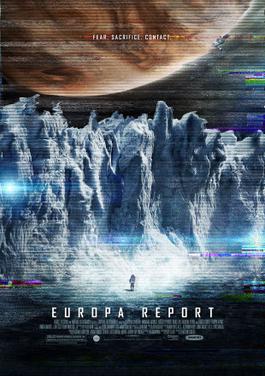A great idea, and half of it is executed brilliantly.
When The G gave me the heads-up about Europa Report being on Netflix, I couldn't wait to watch it. I've thought for years a film about a trip to the moon of Jupiter covered in water ice would be a great idea. But great ideas still need to be executed well, and Europa Report gets a lot of things right, thankfully.
Europa Report follows the crew of the first manned space mission to investigate a moon of Jupiter thought to the best candidate for other life in our solar system. The crew has challenges along the way, one of which damages their communication capabilities back to Earth, so mission control at the private company that funded the mission is in the dark, unsure of whether or not the mission and all aboard have been lost. But we get to see the mission continuing beyond the loss of communication, and reaching its destination. Once they reach the surface of Europa, their quest to find evidence of microscopic life takes a bizarre turn when they begin to notice radioactive distortion in much of their equipment that seems to stem from a luminescent substance beneath the surface of the ice.
The human moments are by far the most effective. The actors (including some genre standouts like Sharlto Copley of District 9, Michael Nykvist of the Millennium Trilogy, and Embeth Davidtz of Army of Darkness) are uniformly quite good. Their moments of recognition as they become the first humans to cross certain barriers and experience things no one from Earth has ever experienced before are captivating. But the second half of the film tries to bridge the gap between sci-fi and horror, as Alien did before it, and those moments are far less engaging. Relying purely on genre tropes, it's impressive the filmmakers generate as much tension as they do, but the repeated moments of "You only have 20 minutes of air left..." and "I think if I just go a *bit* farther..." make the outcomes of these scenes so preordained as to make them far less meaningful. It made me wonder how much better the movie could have been if the filmmakers showed the same dexterity with the horror part as they did with the sci-fi part.
Produced at the end of the "found footage" craze, the film immediately stands out as one of the more effective examples of this style/technique/gimmick. With the exception of three interview cutaways woven throughout the film that lend a documentary angle to the film, all of the camera angles are from fixed positions on the craft recording the progress of the mission. Films like the (quite good) Chronicle begin to strain credulity with the notion that one of the characters is constantly holding a camera as they go about their adventures, and Europa Report deftly dodges that issue. However, the film does suffer from a non-chronological editing structure that it gets no mileage out of. It seems an unnecessary directorial affect, and a linear version of the film might have actually done a better job of intermingling the sci-fi and horror, perhaps reducing the feeling of piling cliches on top of one another.
The Math
Objective Quality: 6/10. After Gravity, even merely competent space effects look like the 21st century equivalent of 1950s films having two characters talk in front of a blank wall with an Erlenmeyer flask on a desk, and we all collectively pretend it's a laboratory.
Bonuses: +1 for getting the emotions right; +1 for an adept approach to "found footage" filmmaking; +1 for cleverly subverting the "documentary" expectations
Penalties: -1 for kind of dropping the ball on what could've been a really good third act
Nerd Coefficient: 8/10, which is pretty dang good by our standards.
